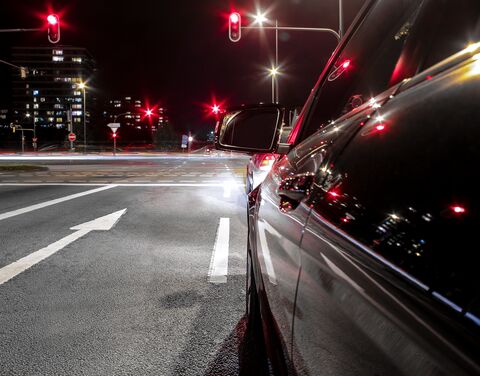
A distraction can quickly lead to an accident. But not every accident is treated the same. If gross negligence is involved, there can be serious consequences. We explain what gross negligence is, when it is deemed to have occurred, what the consequences are, and what it means for your insurance.
Gross negligence means an especially severe error or breach of the elementary duty of care, which can lead to considerable damage or injury. In general, there is the assumption that situations in which someone is considered to have acted with gross negligence could have been prevented through increased attention.
One example of gross negligence while driving is intentionally running a red light or passing another vehicle on a curve with poor visibility. At home, an example of gross negligence would be leaving candles lit unattended on a Christmas tree. Unfortunately, gross negligence happens time and again. That’s why it’s all the more important to deal with the associated insurance questions.
Unlike minor or moderate negligence, gross negligence means the insured committed a very major or severe breach of their duty of care. The following are examples of gross negligence:
When someone is liable for damage or loss that they have caused to someone else is governed in the Swiss Code of Obligations (SCO). One important provision is Article 41 of the SCO, according to which a person who causes harm or injury to another person through intent or negligence is liable for the damage or injury caused. This applies to minor negligence and gross negligence. The liability includes both material damage and immaterial damage (e.g. compensation for personal suffering or satisfaction). On the other hand, liability for motor vehicles is governed in Article 58 of the Swiss Road Traffic Act (RTA).
Gross negligence can entail grave consequences. For this reason, it is important to know which conduct is considered to be grossly negligent to be able to avoid it and ensure your own safety as well as the safety of others. If gross negligence is ascertained in a claim, this can have major impact on insurance benefits. According to the law, in the event of an accident or damage caused by gross negligence, insurance can reduce benefits or reclaim benefits paid to the injured person who is deemed to have been the cause of the claim (this is referred to as gross negligence recourse).
Gross negligence has nothing to do with intentionally causing damage or injury. It can also happen by accident, for example by overlooking a street sign and causing an accident as a result. Even if a certain level of caution was taken, gross negligence with all the consequences can still happen.
Specifically, this means that the car insurance or liability insurance will normally reclaim a part or all of the costs from you if you acted in a grossly negligent way.
To ensure that you are protected against the financial consequences in the event of a claim, you have the option of choosing a «gross negligence» add-on as supplementary insurance as part of your liability insurance, car insurance, or your household contents insurance. With this service, the insurance benefits of your insurance cannot be reduced or reclaimed from you if you caused damage or loss because of gross negligence (this referred to as a «waiver of recourse»). It is a good idea to have this protection against gross negligence or waiver of regress as you can avoid major financial disadvantages this way in the case of gross negligent behavior.
However, there are legally mandated exceptions to the waiver of recourse for which protection against gross negligence does not apply. For example, driving under the influence of alcohol or drugs or a flagrant violation of the permitted speed limit (generally known as «serious speeding»).
Yes, in some cases insurance can (or must) require a contribution of the liable insured or policyholder for the grossly negligent behavior. The amount of your contribution to the compensation can vary depending on the individual agreements and specific situation.
Protection for gross negligence is worthwhile for anyone who wants additional insurance protection. In general, however, it is always suitable because a moment of inattention can happen to anyone. Regarding the costs, protection against gross negligence is much more cost effective than paying the costs incurred in the case of proven gross negligence.
To avoid grossly negligent behavior, it is important to be aware of your own duty of care and act responsibly. This includes following traffic rules, complying with safety guidelines at work, careful handling of property, and an awareness for potential risks.
As a rule, the insurance against gross negligence is considered as an add-on to to personal liability insurance, household contents insurance, or motor-vehicle insurance.
Yes, it pays the damages to the injured person since this person has a direct right of claim against the insurance. However, the insurance can reclaim a portion of the benefits from the policyholder if they acted in a grossly negligent way.